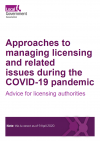Given the unprecedented nature of the current situation, councils are receiving a large number of requests from licensees, both for advice about how they should be operating their businesses in a safe and legal way, and for support at a time where normal operations have been disrupted and the viability of some businesses has been brought into question.
The LGA has sought clarity from the Government on the approach that councils should be taking on various issues both to provide a level of assurance and to support consistency across the country. While Government has not provided detailed responses to many of the issues arising, the broad steer is to encourage councils to take a pragmatic approach where there is discretion to do so. This approach was endorsed in Kit Malthouse’s recent letter1 to chairs of licensing committees and is one that the LGA has supported. The intention of this note is to provide a practical resource for councils, reflecting practices and approaches that are already being used by councils.
When considering how to approach issues in a practical way, the following principles may be
useful:
- Ensuring that there is open and honest engagement with local businesses (in some cases it may be preferable to engage directly rather than through third parties) about the challenges facing both licensed businesses and councils during the COVID-19 response.
- Being as flexible as possible while remaining mindful of the requirements and objectives of relevant legislation.
- Where possible, prioritising requests, applications or hearings that are business critical in terms of the COVID-19 response and potentially deferring those which may not need an urgent response if there are valid reasons why they cannot feasibly go ahead. Each case should be considered on its own merits in discussion with applicants and notes taken outlining the justification for why a decision was reached.
- Planning now for how licensing can quickly scale up work that for legitimate reasons has not been able to be progressed due to COVID-19 issues, eg preparing for additional hearings as a contingency measure.
Whilst all councils will want to support local businesses as much as possible, not least to preserve employment and the local economy, there may nevertheless be challenges to meeting some requests, including: the need to establish new processes under the Emergency Coronavirus Act Remote Meeting Regulations; the legal parameters of different pieces of legislation, (particularly whether councils themselves have the power to set fees locally), and the fact that councils themselves are seeing a significant drop in income and increase in costs as a result of the COVID-19 response. It is also worth bearing in mind that the Government has implemented a range of measures to provide financial support to businesses, but that these are generic schemes that do not relate to specific fees and charges payable by businesses depending on the sector they operate in. During discussions with businesses and licensees, it may be helpful to set out some of the challenges that you are facing to ensure a shared understanding of the different challenges facing both the
licensed trade and councils themselves.

